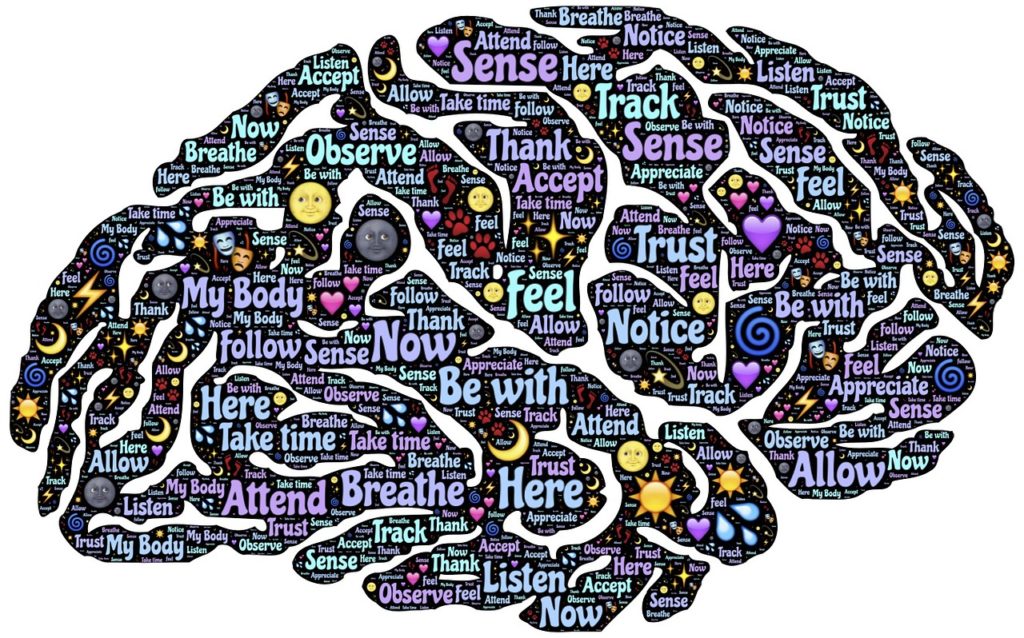(or, “what’s my problem?”)
Core beliefs both define and describe one’s fundamental understanding of self, of other human beings, and of the world one lives in. They are what one believes to be a true, accurate, and reliable comprehension of how the world works. And it is through the lens of such core beliefs that we perceive and interpret our daily experience; which gives rise to such feelings as being happy, distressed, healthy, worried, motivated, etc.
But, like memories and prejudices, one’s core beliefs reside in the subconscious mind, there playing the critical role in determining our judgments and reactions to all that goes on in our world. Thus are they essentially hidden from our conscious awareness…and only rarely are they ever identified or acknowledged in one’s thinking about why or how or what is going on[1].
This reality of our core beliefs being hidden, or one might say “working in the background,” is completely natural. But then, “So what!?” Is there really any benefit, or reason to know, that one has core beliefs? Or, that they are generally hidden and go mostly unacknowledged?
Well, no…unless, of course, you want to change something about yourself. Like you want to be happy (or happy more often). Or not depressed. Or less anxious. Or more caring. Or in better health. Or respected. Or better liked. Or…
Change – that of the positive and desirable kind – requires understanding (of what to do) and effort (of how to do). Both are intimately linked to “the reality of getting it right.” Which means both are tied to one’s core beliefs…of who you are, what you think you’re capable of, and how you correctly understand yourself and the world.
And often this is where one can get in trouble – because these beliefs may be “core” but that doesn’t mean they are in fact true, or accurate, or reliable…[2]
______
So…what are some core beliefs, what are some of your core beliefs, and how did (and do) you get them?
Core Beliefs…
…are what you believe is truth, and that subjectively explain or describe what you perceive as the basic conditions of one’s own and of others’ being, and of how the world works. They are generally global (you “apply them” universally, as in to everyone or to everything), rigid (you allow few if any exceptions), and non-negotiable (you defend them, at least internally, if you sense they’re being attacked or questioned).
Examples of Core Beliefs one might hold about Oneself include: I’m a good person. I’m a bad person. I am capable. I’m incompetent. I am intelligent. I’m a dummy. I am strong. I am weak. I am autonomous. I’m a victim. I’m attractive. I’m ugly. I’m a success. I’m a loser…
Examples of Core Beliefs one might hold about Others include: People are basically good. People can’t be trusted. People are only nice “to your face.” Men are pigs. Women are weak. Strangers are dangerous…
Examples of Core Beliefs one might hold about the World include: The world is round. The world is flat. There are natural laws. God made the world. The world is a friendly place. The world is full of evil. The world is knowable. The world is a mystery. The world is fair. The world is dangerous…
Your Core Beliefs…
…are not, as previously noted, often brought to the level of your conscious awareness. They work, or are held, “below the radar” of your daily experience. But that’s the way we like it. Actually, uh no, that’s really just the way it is; for no one has an interest in, or a use for, being “constantly aware of” core beliefs. And yet…they can (and may) be identified and articulated, especially if you’re in crisis, or being pressed or challenged by someone to defend or explain why you acted or spoke as you did in a particular situation.
To get a sense of your own core beliefs, revisit the previous section’s examples…and consider your response to each one. Do you find you agree with some? Are totally opposed to others? Or find there is some middle ground, or even an entirely “different take” on the idea (belief) expressed? What you come up with will serve as a partial glimpse of who you are.
Conditioning (Or, How You Got Your Core Beliefs…)
…can be rather disturbing to learn. But it can also provide helpful insight as to “who you are” and “why you are you.” It may also serve as an appropriate consideration if you’ve ever had the thought, “What’s my problem?”
The short answer to where your core beliefs come from is: “They come from your conditioning.”
But let’s “unpack” this simple statement to fully appreciate the huge impact this reality has had on your life. To start, conditioning is the mental process[3] in which your mind is “trained” to believe and/or do certain things.
In children (and this of course happened to you), this process is pretty much automatic – meaning there is no rational or mindful understanding of what is going on. The young mind is always reacting to whatever stimulus or event by 1) generating emotion, 2) engaging some behavioral response, and 3) reconciling the reaction, as in “making sense of” (or trying to) the stimulus or event or experience.
In terms of the ERM[4], it is the child’s Rider that experiences (i.e., is consciously aware of) the emotion and executes the response that has “come up” from the Elephant. But the child’s Elephant is also meanwhile “automatically” checking prior experience, forming new connections, and building “a better” understanding of the world and how it works. Thus prior beliefs may be modified and new ones develop. And these will be “tested” and modified again when necessary by later experience. And so does the conditioning process go on…
______
This experiential reality of childhood occurs with minimal discriminating judgment involved…be-cause the rational, logical, critical thinking capacity (of one’s Rider) hasn’t developed to a level or degree of maturity to operate effectively (or, let’s say, “effectively enough”); and in fact this capability really develops only later with brain growth[5]. Put in another maybe harsh yet not inaccurate way, childhood is a period of high vulnerability to indoctrination.
And so, over time, what “gets in there and stays” – like core beliefs, but also skills, habits, biases, memories, as well as “other beliefs” [derived from core beliefs] often identified as attitudes, rules, and assumptions – is directly related to, and is the result of, one’s particular life events[6] and how one comes to interpret or “make sense of” them within the context of their unique life situation.
Conditioning in children is both externally driven[7] and internally directed by desire[8]. It’s really no different in the adult – except for one major factor: The adult Rider is potentially able to make informed decisions (i.e., question, examine, analyze, and consider) about what to do – or to stop doing, and about what to believe or reject.
______
So…conditioning – in both the child and the adult – is a process of constantly being exposed and often targeted with such sensory information that is often intended to make you retain and come to believe its truth, relevance, or importance in the living of your life. But then, you have also been “exposed to” a wealth of random and arbitrary information or stimuli as well – both serendipitous and adverse – that has been “processed” and, some of which, also retained; and that affects your understanding of how the world is, and how you will react (i.e., change) going forward.
Thus it can be rather sobering – as well as disturbing – to step back and consider that:
- One has had little, if any, control over what one is exposed and subjected to.
Your ethnicity, the environment in which you grew up, the people who raised you, the culture that shaped you, and the fateful experiences you’ve had…were all beyond any kind of personal control or individual choice. In this sense, you are simply a product of your upbringing. Some might argue that you are also a victim, or in a more optimistic light a survivor, of that upbringing.
- What you mostly believe was actually “implanted” in your brain by others who were in authority over you (usually parents, guardians, teachers, clerics, and other relatives).
This does not mean they were bad or scheming manipulators (although unfortunately some are). But it does mean that you were likely subjected to some maladaptive beliefs and behaviors that came to be embedded in your present being as core beliefs – about how the world supposedly “works.”
- Your core beliefs can – and do – change…but how and why will remain arbitrary (i.e., outside your control) unless you choose otherwise.
The reality is that most people do, or at least try to, “choose otherwise;” and this is generally an empirical process motivated by some kind of emotional distress. In adolescents, it can be seen in terms like “growing up,” “maturing,” “rebelling,” and “searching for.” In adults, it is often fueled by some personal crisis or situation that has grown intolerable.
Dysfunctional Conditioning (Or, Considering How You Got So Screwed Up…)
The word dysfunctional means “not operating normally or properly.” With conditioning, the term refers to the kind of learning that can distort one’s interpretation, or mistakenly represent the understanding one has, of “what is really going on.” Examples are numerous but what may serve best here is for you to consider some of your own; e.g., reflect on changes in your thinking and beliefs about the world from when you were a child and then through adolescence…
Then consider the possibility – actually the likelihood – that some of your own core beliefs may be dysfunctional. (Granted, this is nearly impossible to do in the moment – but there are ways, given the skillset to do so…) More to the point, given the programming, indoctrination, and conditioning you’ve been subjected to your whole life (again, without your awareness or “permission”), it may now serve as a humbling realization to acknowledge what is both a challenge and an opportunity…to make the world – your world, and the people you care for – a better place.
______
Self-regulation – (in part) that ability to calm yourself down when you’re upset and cheer yourself up when you’re down – works far better when you get the reality right. Core beliefs are a measure of that effort…
___________________________________________
[1] Go ahead and think about some of what you would consider your core beliefs…and notice they are likely not the thoughts you have in your daily experience…
[2] Just something to keep in mind…!
[3] Brain activity involving neurons and associated elements arranged to “behave” in a certain way to acquire memory, repeatability, and consistency. (One might check out the neuroscience of “neurons that fire together wire together…”)
[4] The Elephant/Rider Model of the mind, where the Elephant is the subconscious part and the Rider is the conscious, aware, experiencing part.
[5] The area of the brain for such “thinking” is the pre-frontal cortex, which undergoes significant growth and development from around age 7 to one’s twenties…
[6] Especially those that are [or nearly] traumatic…
[7] Just for example: Seeing commercials that inform, familiarize, and are repeated so as to “plant” certain information intended by the advertiser [so you’ll buy the product if the need arises or a desire is triggered]; or, a parent telling you “to behave” which eventually comes to mean “act (or not act!) in certain ways.”
[8] E.g., walking, talking, or learning to perform some desired action (playing a guitar, riding a skateboard) so as to acquire the skill to use it.

